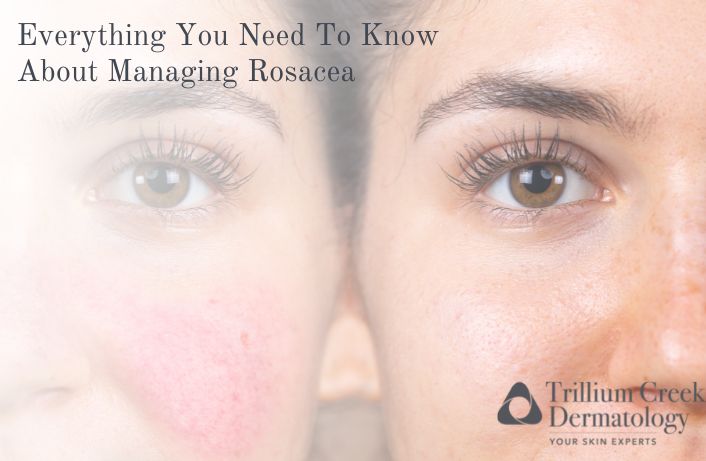
If you have rosacea, we know it can be frustrating and embarrassing but there’s no need to suffer in silence! With the right information and treatment, you can control your rosacea and keep it from taking over your life.
What is rosacea?
Rosacea is a chronic skin condition most commonly recognized by red, flushed skin. Other symptoms may include burning or stinging sensations, oily skin, large pores on the face, and sensitivity to sunlight or wind. There are different subtypes of rosacea based on the severity of these symptoms. Although it most commonly affects the face, rosacea can also develop on the arms, legs, chest, and scalp.
This skin condition affects about 1 in 10 people in the United States and is more common in women than men. Some factors that may increase your likelihood of developing rosacea include genetics, sun exposure, and certain medications.
How can I prevent rosacea?
Although you may be unable to completely prevent rosacea, try these solutions to decrease the severity of symptoms.
- Avoid sun exposure, especially during peak sun exposure times
- Protect your skin from the cold
- Eat foods high in antioxidants
- Simplify your skincare routine
- Common triggers can be:
- Hot coffee/tea,
- Stress
- Exercise
- Hot tubs/saunas
- Spicy foods
- Wine (especially red wine) and other alcoholic beverages
- Medications that dilate blood vessels
How is rosacea treated?
Your doctor will ask about your symptoms and a history of sun exposure. If you’re worried about your rosacea, your doctor may also want to take a skin biopsy (a small sample of tissue from the surface of your skin) to rule out other conditions.
You should see a doctor if you are struggling with rosacea symptoms or if the condition is causing significant facial pain or discomfort. Your doctor may recommend treatments such as prescription medications or laser surgery. Sometimes, your doctor may also recommend lifestyle changes, such as avoiding sun exposure and using a sunscreen that protects against UVA and UVB radiation. You may need long-term treatment with medication and/or therapy if you have severe rosacea.
The best treatment for rosacea depends on the severity of your symptoms. You will likely need to use a topical cream or lotion daily to control redness and inflammation. You may also need to take prescription medications to reduce the appearance of your skin lesions. You may need long-term treatment with medication and/or therapy if you have severe rosacea.
What are the risks associated with rosacea?
The most common risk associated with rosacea is that the condition will worsen over time. If left untreated, rosacea will spread to the other parts of your face, including your eyes which can lead to social isolation and embarrassment. You can also end up with permanent damage to not just your skin, but also your eyes.
Setting up a Consultation
At Trillium Creek Dermatology, we offer a variety of consultations that are tailored to meet your needs. If you would like to schedule a consultation with us, please call (330) 725-0569 or book an appointment online. We have five convenient locations in Brunswick, Medina, Strongsville, Wadsworth, and Wooster. We look forward to helping you get the best care for your skin.


